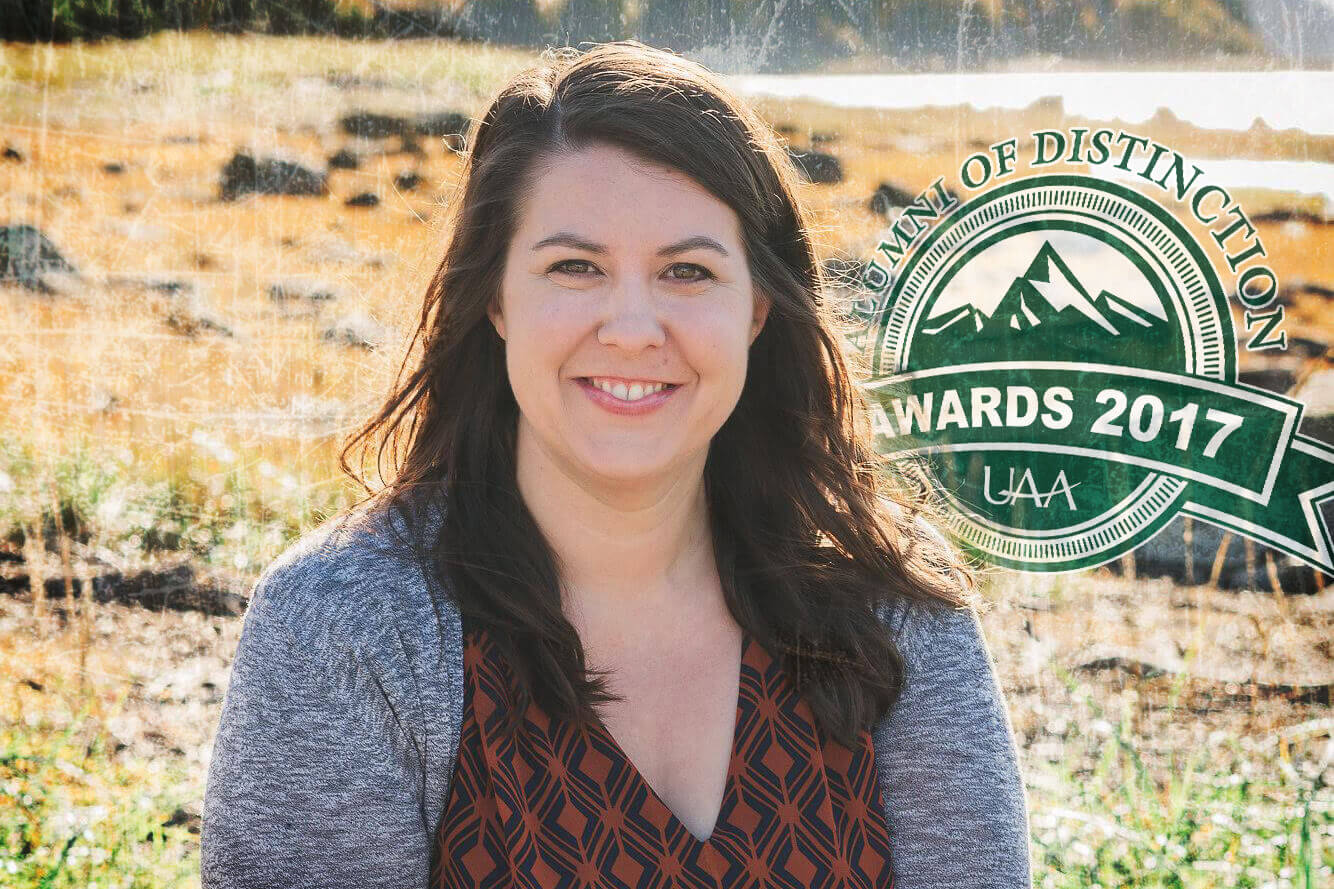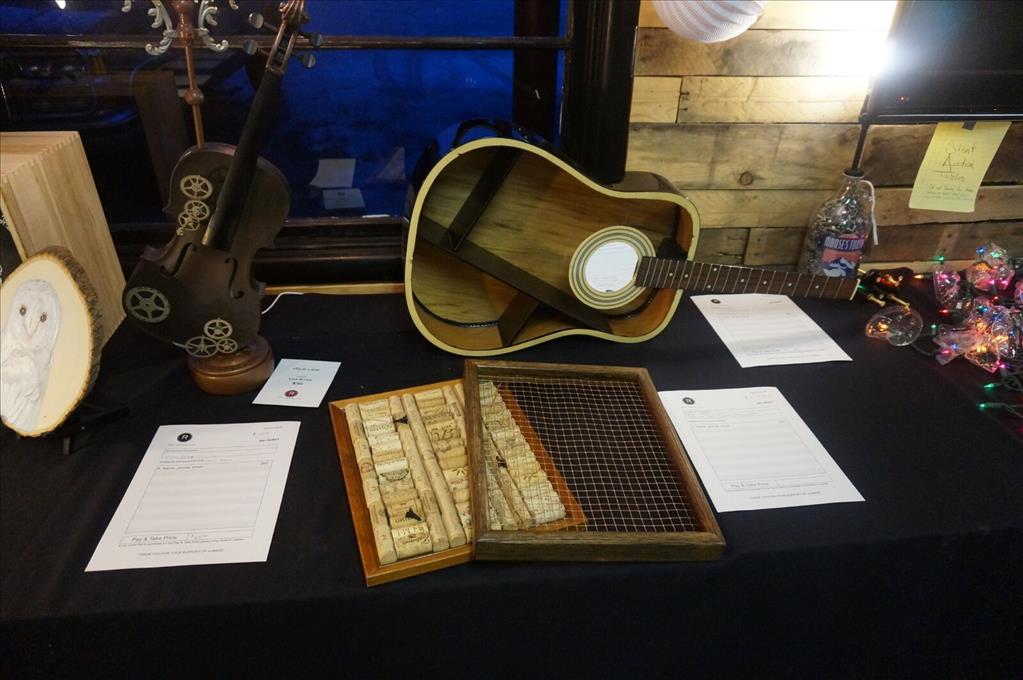Alumni of Distinction: Michelle Sloper ’08
by J. Besl |

Michelle Sloper, B.A. Psychology ’08, will receive the 2017 Alumni Emerging Leader award at the Homecoming Breakfast on Oct. 13.
Since earning her Ph.D., Shelly Sloper has been making a nationwide difference from her hometown of Haines.
A graduate of Claremont Graduate University (CGU) in Claremont, California, Sloper now works as a professional evaluator through the university’s applied research arm, Claremont Evaluation Center. She works remotely from Haines, partnering with programs like an East Coast women’s housing shelter, a California school district, and nationwide food banks to improve the lives of youth across the country.
After receiving her undergraduate degree in psychology, Sloper went on to earn a master’s and doctorate at CGU. Her program—positive developmental psychology and evaluation—isn’t common, but it was an excellent fit for a positive person like Sloper.
Rather than focus on mental diseases and disorders, positive psychologists work to improve quality of life for everyone, regardless of mental health, and elevate people to a position of thriving and well-being. Essentially, positive psychologists study what makes people happy and what’s good in the world. Pretty nice, right?
Sloper chose CGU because it combined positive psychology with her career interests in youth development. Specifically, she’s interested in how youth-focused community-based programs can offer high-quality and positive developmental experiences. The results are important to her; she knows the power of a positive environment from her time at UAA.
Whether in class or on the job, Sloper’s psychology professors and her supervisors in the Student Union encouraged her to thrive. “I just felt so well prepared to participate in grad school,” she said of the support on campus. “The people I met at UAA … I just felt like they really believed in me, and they really wanted to give me opportunities I hadn’t had before that were very leadership-focused. That was really important to me.”
An Appreciation for Evaluation
Sloper is now a senior evaluation fellow at the Claremont Evaluation Center, evaluating, publishing and presenting on how youth-focused programs can provide the same encouraging environment.
Evaluation—or, taking a long, objective look at a program’s operations and effectiveness—may sound distant or clinical, but in Sloper’s hands it’s the opposite.
“I think evaluation, even the word itself, feels very punitive or negative at first. For us, that’s definitely not how we see evaluation,” she said. “I approach every organization with a lens of being responsive to their needs. I don’t want to do work unless it’s going to make a difference for them.”
Sloper now manages multiple evaluation projects at a time, including programs like the Los Angeles Unified School District, Boys and Girls Club of America and Feeding America. “You’re never really working on any one project at a time,” she noted. “It’s a lot of time management and project management.”
These programs benefit from an external perspective, as Sloper brings in academic research, developmental psychology theory and industry examples that may provide guidance. The resources and conversations are different every time. “It’s really all about learning and building capacity for organizations,” she noted.
So how does this work? To gauge a program, Sloper employs surveys, interviews, focus groups and simple on-site observations to identify strengths and opportunities for a program. But often, these programs are massive. Boys and Girls Club alone operates in 4,300 communities, and the Los Angeles school district runs after-school programs at more than 100 sites. Since there’s no way to see an entire operation, Sloper often designs tools that program staff can use to provide data. She’ll then assess that mountain of information to help guide change. Here’s the data, what do you think is the best course of action? What would lead to improvement?
“It’s more about facilitating those conversations than making actual recommendations,” she said.
Amid the bustle of her professional career, Sloper also has two more clients tacked on. In 2016, following a rigorous application process, she was named a fellow for the PACE Project (Partnerships for Advancing Character Program Evaluation), one of eight evaluators chosen nationwide. That opportunity has connected her with a women’s shelter in Brooklyn and an Ohio-based youth accountability program, too.
And yes, she does all this from Haines. It’s a lot of travel, but it’s worth it.
“There are some challenges,” she admitted, “but … I want to be here in Alaska.”
And she wants to be in this career field. Giving back to the next generation is important for many, but for Sloper, it’s a career. And thanks to her academic background and career influence, she can articulate it, too.
“There is a lot of research in positive psychology about how you gain happiness and identity and well-being from serving other people,” she said.
Whether she’s guiding opportunities for current CGU students or helping to shape a program that will make a difference in a community, Sloper is here, professionally and personally, to help.
 "Alumni of Distinction: Michelle Sloper ’08" is licensed under a Creative Commons Attribution-NonCommercial 4.0 International License.
"Alumni of Distinction: Michelle Sloper ’08" is licensed under a Creative Commons Attribution-NonCommercial 4.0 International License.














